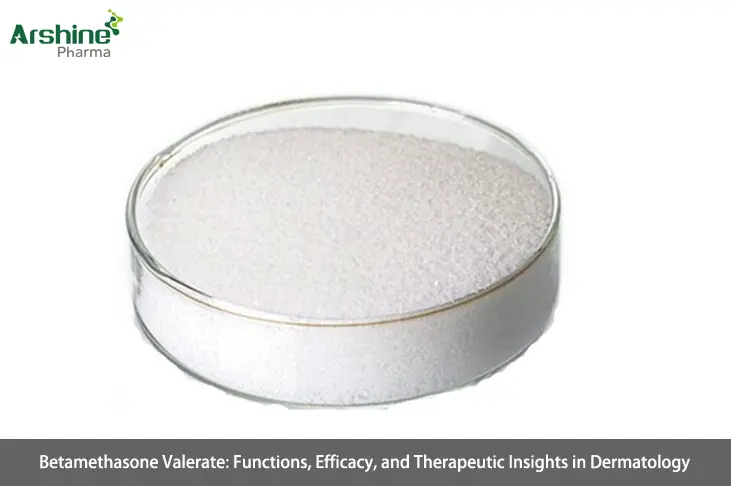
Introduction:
Betamethasone valerate, a potent corticosteroid, stands as a cornerstone in dermatological therapy due to its anti-inflammatory, immunosuppressive, and vasoconstrictive properties. Renowned for its efficacy in managing various dermatological conditions, betamethasone valerate plays a crucial role in alleviating inflammation, itching, and discomfort associated with skin disorders. This comprehensive exploration aims to unravel the mechanisms of action, functions, therapeutic uses, and efficacy of betamethasone valerate in promoting skin health and managing dermatological ailments.
Understanding Betamethasone Valerate:
Betamethasone valerate belongs to the class of synthetic corticosteroids and serves as a medium-potency topical corticosteroid. Chemically, it is known as 9-Fluoro-11β,17,21-trihydroxy-16β-methylpregna-1,4-diene-3,20-dione 17-valerate. This compound exerts its pharmacological effects by modulating the immune response, suppressing inflammation, and inhibiting various inflammatory mediators in the skin.
Functions and Mechanisms of Action:
1. Anti-Inflammatory Action: Betamethasone valerate acts by binding to glucocorticoid receptors in the skin cells, subsequently inhibiting the transcription of pro-inflammatory genes and reducing the release of inflammatory cytokines. This results in the suppression of the inflammatory response.
2. Immunosuppressive Effects: By suppressing the immune system's activity in the skin, betamethasone valerate reduces immune-mediated inflammatory reactions, preventing excessive immune responses seen in various skin conditions.
3. Vasoconstrictive Properties: Betamethasone valerate possesses vasoconstrictive properties, reducing vasodilation and decreasing blood flow to the affected skin areas, which helps in alleviating inflammation and swelling.
4. Antipruritic (Anti-Itching) Action: It relieves itching associated with skin conditions by reducing inflammation and inhibiting the release of pruritic (itch-inducing) mediators.
Efficacy in Dermatological Conditions:
1. Eczema (Atopic Dermatitis): Betamethasone valerate is effective in managing eczema by reducing inflammation, itching, and redness. It is commonly used in short courses to alleviate acute flare-ups.
2. Psoriasis: It is an essential component in the management of psoriasis, where it helps reduce the excessive skin cell turnover, scaling, and inflammation associated with the condition.
3. Contact Dermatitis: Betamethasone valerate is utilized in managing allergic contact dermatitis and irritant contact dermatitis, providing relief from inflammation and itching.
4. Dermatitis and Dermatosis: In various types of dermatitis (such as seborrheic dermatitis) and dermatoses (skin disorders), betamethasone valerate aids in reducing inflammation and alleviating symptoms.
5. Pruritus (Itching): It is effective in alleviating itching associated with various skin conditions, offering symptomatic relief and improving the quality of life for individuals with persistent pruritus.
Therapeutic Considerations and Insights:
1. Dosage and Application: Betamethasone valerate is available in various formulations, including creams, ointments, lotions, and foams. Dosage and application instructions should be strictly followed, and the use of occlusive dressings should be under medical supervision.
2. Duration of Use: Prolonged use of betamethasone valerate should be avoided due to the risk of skin thinning (atrophy), stretch marks (striae), and other adverse effects associated with chronic corticosteroid use.
3. Side Effects and Precautions: Common side effects may include skin irritation, burning, dryness, and folliculitis. Precautions should be taken to avoid its use on the face, in skin folds, or on areas with thin skin.
4. Withdrawal and Rebound Effects: Abrupt discontinuation after prolonged use may lead to rebound flares of the skin condition. Gradual tapering under medical guidance is recommended.
5. Pediatric and Geriatric Use: Caution is advised in pediatric and geriatric populations, as their skin may be more sensitive to the effects of corticosteroids.
Conclusion:
Betamethasone valerate, as a potent corticosteroid, plays a vital role in the management of various dermatological conditions characterized by inflammation, itching, and skin disorders. Its anti-inflammatory, immunosuppressive, and vasoconstrictive properties contribute significantly to alleviating symptoms and improving skin health. However, careful consideration of dosage, duration of use, and monitoring for side effects is crucial to ensure its safe and effective application. As ongoing research continues to explore its mechanisms and potential applications, betamethasone valerate remains a cornerstone in dermatological therapy, providing relief and comfort to individuals suffering from a range of skin conditions.
